Health
News: Kitchen Staple Reverses Thinning Hair + Slows Down Graying — For Pennies A Day!
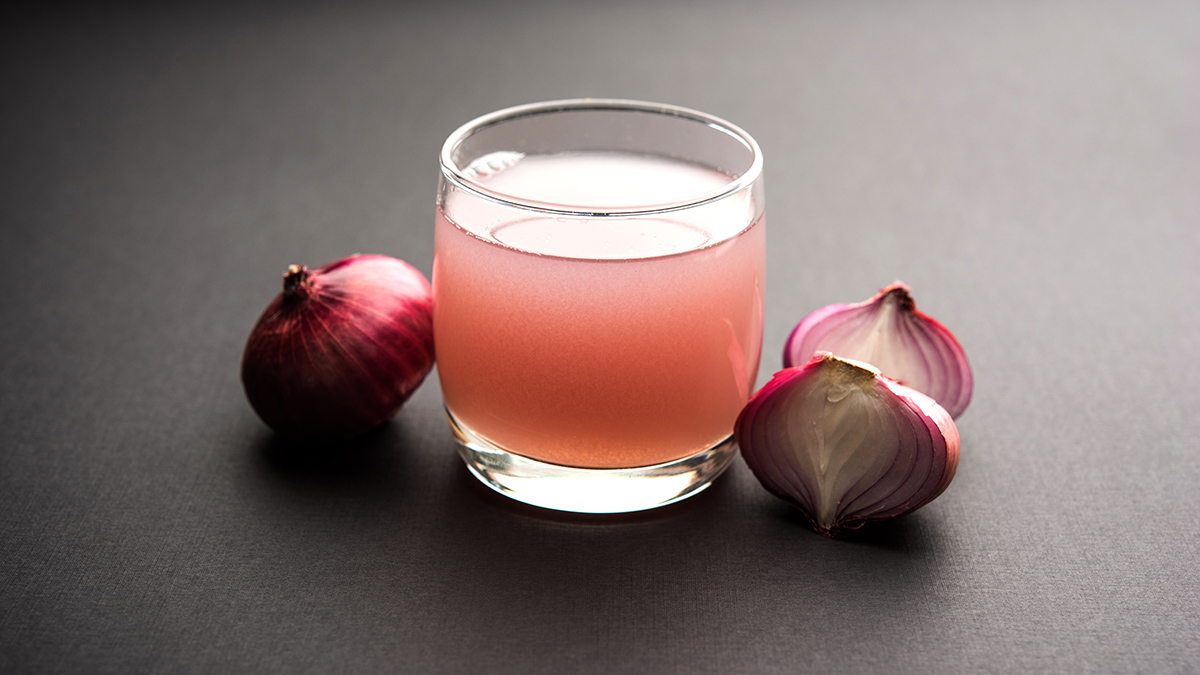
Regrow thick, shiny, healthy hair with a few onions you tossed in the blender? Yes, say researchers publishing in the Journal of Dermatology, who found that simply applying blended up onions to your scalp produces greater benefits than pricey specialty hair loss products. That finding would come as no surprise to ancient Romans. One of the earliest texts referencing the natural remedy dates back to the 1st century, when Pliny the Elder suggested mixing onion with honey or vinegar to treat hair loss.
Today, the humble, healing onion is experiencing a resurgence in popularity, thanks to the new research that confirms its effectiveness in promoting hair growth — and to viral posts on TikTok and Instagram. Case in point: rapper Cardi B. posted about her success washing her hair with onion water on Instagram — it’s hard to deny that shine!
Keep reading for an overview of the most common causes of hair loss, the science that supports using onion juice to reverse it and an easy how-to so you can reap the benefits for pennies a day.
The most common causes of hair loss
Even if you notice more shedding than usual right now, it doesn’t mean you’re resigned to sparser strands forever. Here’s a look at some of the most common hair loss triggers:
1.) Aging and menopause
It’s no surprise that getting older is one of the most common causes of hair loss. As you age, your natural hair growth cycle slows, leading to a reduction in hair thickness and density. Simply put, the body isn’t able to keep up with producing new strands as quickly as older strands fall out. What’s more, individual hair strands become smaller, making hair appear less thick and lush than it once did.
For women, menopause can accelerate this process. “Hormonal imbalances experienced during menopause can contribute to hair loss as levels of estrogen, which supports hair growth, decline,” says Anna Chacon, MD, and board-certified dermatologist. It’s so common, hair loss affects up to 60% of women during menopause, a study in Menopause Review suggests.
2.) Both chronic and extreme stress
Researchers at Harvard University found that chronic stress, the kind of tension that lingers for weeks or months, can significantly slow hair growth. The investigators explain that stress increases levels of corticosterone, a hormone that prevents the release of a follicle-stimulating molecule known as GAS6.
Sudden or extreme stress, like the kind you’d experience losing a loved one or your job, can also accelerate hair loss. It’s a phenomenon researchers have dubbed telogen effluvium. It pushes follicles into a resting phase, which can lead to rapid fall out or even clumps of hair loss. Though it might seem alarming, experts say this type of hair loss is temporary and normal growth usually picks back up as your stress fades.
3.) The change of seasons
A lesser-known cause of sparse strands: Seasonal shifts. Fluctuations in temperature and humidity levels can affect the hair growth cycle, leading to a condition known as seasonal hair shedding. A study published in Dermatology found that hair growth is typically slowest in winter and fastest in summer. If you notice more strands in your hair brush during those seasonal shifts, it’s because your hair is being pushed into its shedding phase.
4.) Key nutrient deficiencies
“Iron, biotin, protein, and zinc are all critical for hair health,” reveals Dr. Chacon. “Iron helps red blood cells carry oxygen to hair follicles, biotin and protein are building blocks for hair, and zinc helps with tissue growth and repair, including hair growth.” And since research in the Journal of Nutrition, Health & Aging found up to 46% of adults are deficient in protein alone, it’s no wonder that a nutrient shortfall is one of the top sneaky causes of hair loss.
How onion juice promotes hair growth
You know onions make a great pizza topping and pack a tasty punch in soup, but how exactly do they work their magic on your hair? According to Dr. Chacon, it’s largely due to onion juice’s anti-inflammatory properties.
“Quercetin, a powerful antioxidant found in onions, may help to reduce inflammation and fight free radicals, thus potentially alleviating inflammatory conditions,” says Dr. Chacon. “It also stimulates the scalp to produce more of an enzyme called catalase. Catalase helps break down hydrogen peroxide, a chemical that can damage cells and cause hair thinning.”
Proof it works: A study in the Journal of Dermatology found that when folks with hair loss washed their scalps with onion juice twice daily, 87% experienced hair regrowth within six weeks. And some even started to report new growth in as little as two weeks.
How onion juice slows down hair graying
And preventing hair loss isn’t the only trick up this veggie’s sleeve: The catalase in onion can also help fight back against gray hairs, a study The FASEB Journal suggests. “Hydrogen peroxide accumulation in the hair follicles can lead to oxidative stress, which can cause hair to turn gray,” explains Dr. Chacon. It works by reducing the amount of melanin, or pigment, in hair strands. Hair with little to no melanin left appears gray or white. “By breaking down hydrogen peroxide, catalase can potentially help to slow down the graying process.” (Embracing gray hair? Click through to find out how to keep it shiny and healthy)
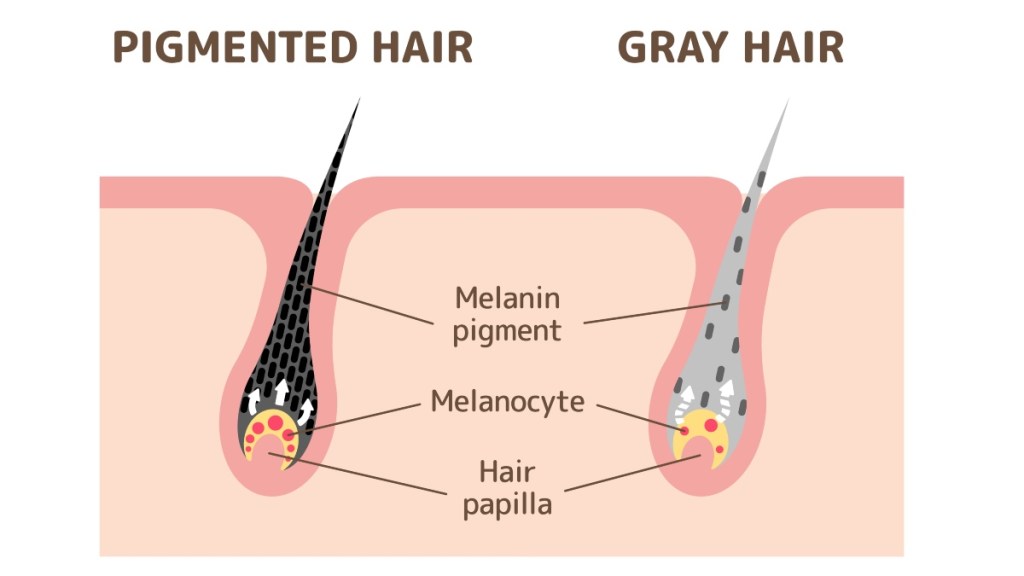
The best ways to use onion juice for hair growth
When it comes to tapping into the power of onion juice for hair growth, there are two easy ways to reap the benefits: A DIY treatment or store-bought products infused with onion juice.
Option 1: A homemade onion juice scalp treatment boosts hair growth
You don’t have to be a beauty guru to whip up an onion juice tonic to boost hair growth. All you need is a few onions and a blender! Here, a quick and easy recipe from licensed cosmetologist Anna Peterson, creator of Salon Route.
- Dice two medium-sized onions and blitz in a blender until you get a smooth pulp. Strain the juice into a bowl or jar. Tip: You can add a few drops of essential oil (such as rosemary, lavender, or lemon) to the liquid to reduce the onion odor during application.
- Using a cotton ball, apply the onion juice directly onto your scalp, ensuring it covers the roots. Cover with a shower cap if desired, then let it sit for 30 minutes.
- Thoroughly wash your hair with a mild shampoo. And don’t worry about any lingering odor! Any leftover onion-y smell will disappear after a quick shampoo. For best results, repeat twice a week.
Sensitive skin? Peterson suggests conducting a patch test first, as onion juice may cause redness or itching. “If you experience such reactions, dilute it with water or combine it with honey to reduce irritation,” she suggests.
Option 2: Onion oil shampoo and conditioner boost hair growth
Not into DIY recipes? You can still harness the power of onion juice for hair growth by using an onion oil shampoo and conditioner daily. One we like: WOW Skin Science Onion Black Seed Oil Shampoo & Conditioner Set (Buy from Amazon.com, $25.95). The duo contains red onion black seed oil as well as sweet almond oil, Vitamin B5, and argan oil to boost hair strength and shine. As with the homemade recipe, you can set aside fears of a lingering unpleasant odor. Several reviewers noted that this set does not smell like onion and carries a soft and pleasant floral scent.
Other natural ways to increase hair growth
To speed your results, we’ve rounded up a few of the best study-backed remedies proven to halt hair loss and spark new growth.
Savor a protein-packed breakfast
Your hair tends to grow faster in the morning, according to University of Southern California research, since your body clock tells hair-producing cells that it’s time to increase cell division that naturally slowed overnight. That’s why powering up your follicles first thing is one of the easiest ways to encourage healthy growth. Your best bet: A hearty dish made with eggs. Eggs increase your body’s ability to produce keratin, the protein that makes up hair strands. That’s something research in The Scientific World Journal suggests makes hair 34% stronger within 60 days and reduces shedding up to 47%. Bonus: Increasing your keratin intake has also been shown to improve hair’s shininess and brightness. (Click through to our sister site to find out the simple hack that guarantees extra-fluffy scrambled eggs)

Treat yourself to a scalp massage
This simple and relaxing method can be a powerful technique to stimulate hair growth and improve the overall health of your hair, according to Dr. Chacon. When you massage your scalp, you increase blood circulation to the hair follicles. Plus, a quick rub helps unclog hair follicles and removes excess sebum, allowing new hair to grow unimpeded.
A study in the journal ePlasty found folks who spent a few massaging their scalps daily significantly increased hair thickness. What’s more, University of California, Berkeley, researchers revealed that a daily scalp rub reversed hair thinning for up to 69% of folks.
For the best results, use your fingertips to massage your scalp in circular motions. Tip: to boost the benefits, massage your scalp with a few drops of diluted rosemary oil. Research in the journal SKINmed found it boosts hair growth as effectively as the gold-standard treatment minoxidil.
Tap into the power of a pine tree
A study in Health Science Reports found that supplementing daily with pycnogenol, a compound sourced from the bark of French pine trees, boosts hair thickness by as much as 30% in two months. Researchers say the compound increases nourishing microcirculation to the tiny capillaries in the scalp by 44%. Thick enables hair to grow thicker and healthier. One to try: Healthy Origins Pycnogenol (Buy from Amazon.com, $37.99).
For more natural ways to reverse hair loss, check out these stories:
This content is not a substitute for professional medical advice or diagnosis. Always consult your physician before pursuing any treatment plan.
Woman’s World aims to feature only the best products and services. We update when possible, but deals expire and prices can change. If you buy something via one of our links, we may earn a commission.
Questions? Reach us at shop@womansworld.com

Health
Flexitarian vs. Vegetarian — What’s the Difference? | Woman's World

Sign Up
Create a free account to access exclusive content, play games, solve puzzles, test your pop-culture knowledge and receive special offers.
Already have an account? Login
Forgot your password?
Get back to the Sign In
Use left and right arrow keys to navigate between menu items.
Use escape to exit the menu.
Health
Many families take patients off life support too soon after traumatic brain injuries: study

Many patients who died after traumatic brain injuries may have survived and recovered if their families had waited to take them off life support, a new study found.
Researchers from Massachusetts General Hospital, Harvard Medical School and other universities analyzed “potential clinical outcomes” for patients with traumatic brain injury (TBI) who were removed from life support, according to a press release.
The study included 1,392 patients who were treated in 18 trauma centers across the U.S. over a 7½-year period.
HUNDREDS OF RURAL HOSPITALS ARE IN DANGER OF SHUTTING DOWN, STUDY FINDS: ‘AT RISK OF CLOSURE’
Using a mathematical model, the researchers compared patients for whom life support was withdrawn to similar patients who were kept on life support.
Among the group for whom life support was not withdrawn, more than 40% recovered at least some independence, according to a press release.
Many patients who died after traumatic brain injuries may have survived and recovered if their families had waited to take them off life support, a new study has found. (iStock)
The researchers also discovered that the notion of remaining in a vegetative state was an “unlikely outcome” six months after injury.
When designing the study, the team didn’t know what to expect, according to study author Yelena Bodien, PhD, of the Department of Neurology’s Center for neurotechnology and neurorecovery at Massachusetts General Hospital.
HOME HOSPITAL CARE BRINGS ‘PHENOMENAL’ BENEFITS TO PATIENTS AND PROVIDERS, STUDY FINDS
“Our anecdotal experience was that some families are told their loved ones had no chance for recovery, they would never walk, talk, work or have a meaningful relationship again — yet they chose not to discontinue life support and their loved one made a remarkable recovery,” she told Fox News Digital.
“On the other hand, clinicians are under a lot of pressure to make early prognoses and do not want to commit someone to a life that would never be acceptable to them, so it could be that those patients who died after life support was withdrawn would have had very significant impairments otherwise.”

“Our anecdotal experience was that some families are told their loved ones had no chance for recovery … yet they chose not to discontinue life support and their loved one made a remarkable recovery,” a researcher said. (iStock)
“I think there are two stories here,” said Bodien.
“One is that some patients with traumatic brain injury who died because life support was withdrawn may have recovered, but the other is that many would have died even if life support was continued.”
A patient’s prognosis after severe traumatic brain injury is highly uncertain, she noted. “Sometimes patients with the most devastating injuries survive and make meaningful recoveries.”
“Families can advocate for delaying a decision to discontinue life support if this is aligned with what they believe their loved one would want.”
The problem, Bodien said, is that health care providers lack the tools required to determine which patients with devastating injuries will recover, to what extent they will recover — and how long that will take.
‘Very important’ study
Dr. Marc Siegel, clinical professor of medicine at NYU Langone Medical Center and a Fox News medical contributor, was not involved in the research but said it was a “very important” study.
“Previous research shows a high-level recovery from mild TBI and a significant recovery percentage even with moderate to severe injury,” Siegel told Fox News Digital.
HEAD INJURY ASSOCIATED WITH DOUBLED MORTALITY RATE, 30-YEAR STUDY REVEALS
“After head trauma, the brain may swell, and the use of mannitol and steroids and even sometimes surgery — where the top of the skull is removed — can be used to decrease pressure on the brain and increase chance of a full recovery,” he continued.
Rehabilitation is also crucial, Siegel added.
“All of these tools should be given a chance to work in most cases.”
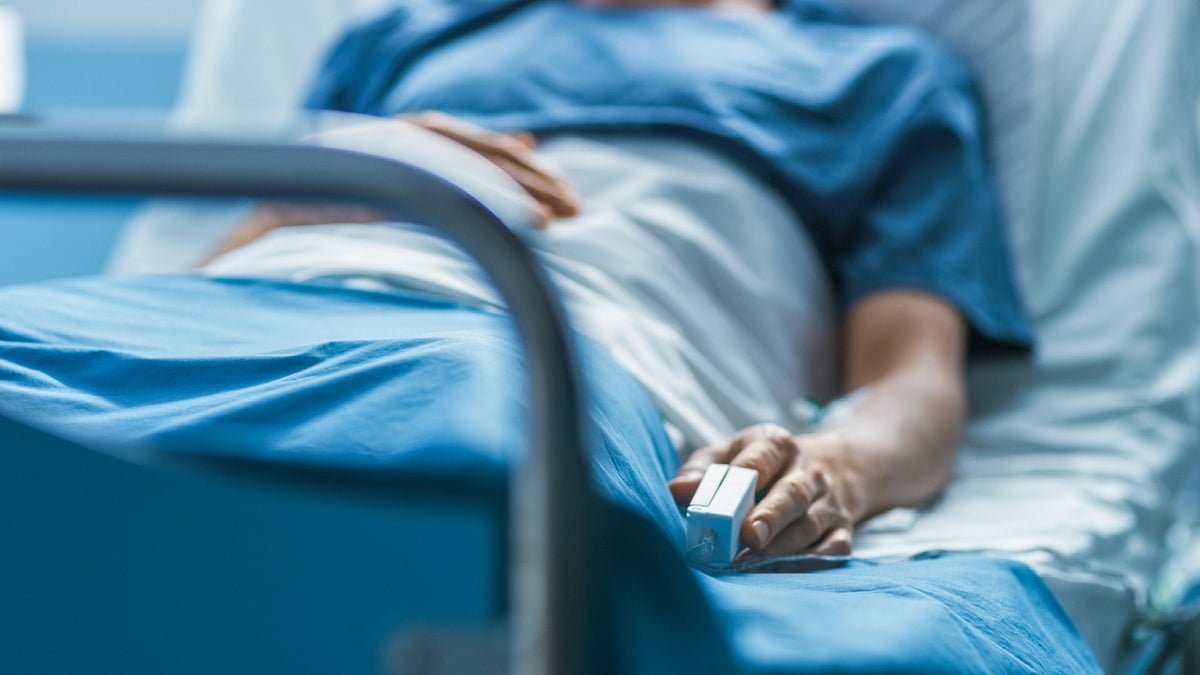
Health care providers lack the tools required to determine which patients with devastating injuries will recover, to what extent they will recover and how long that will take, a researcher said. (iStock)
Based on the study findings, Bodien recommended that clinicians should be “very cautious” with “irreversible decisions” like withdrawing life support in the days following traumatic brain injury.
“Families should also be aware of our results so that they can advocate for delaying a decision to discontinue life support if this is aligned with what they believe their loved one would want,” she added.
Limitations of the research
There were some limitations to the study, Bodien said.
“The sample size of the study was small, which made it difficult to find an adequate number of participants who did not have life support discontinued and were clinically similar, or ‘matched,’ to those who had life support discontinued,” she told Fox News Digital.
CLICK HERE TO SIGN UP FOR OUR HEALTH NEWSLETTER
Among the participants who did not have life support discontinued, the researchers were not able to follow all of them for a six-month period.
Another limitation is that the researchers used clinical variables that were available on the day of, or the day after, hospitalization — but sometimes decisions to discontinue life support are made several days later.

Based on the findings, study author Yelena Bodien (not pictured) recommended that clinicians should be “very cautious” with “irreversible decisions” such as withdrawing life support in the days following traumatic brain injury. (iStock)
“There are many considerations that may lead to a decision to discontinue life support after traumatic brain injury that we were unable to factor into our analyses,” she continued.
“For example, personal beliefs, religion and advanced directives could all affect decision-making but were not captured in our study.”
Bodien also noted that the Harvard study was focused on traumatic brain injury and cannot be generalized to other injuries and illnesses.
For more Health articles, visit www.foxnews.com/health.
Health
7 important health stories you might have missed this week: Catch up here

Every day of the week, Fox News Digital publishes a range of health pieces to keep you up-to-date on the most important wellness news.
We cover cutting-edge medical research, breakthrough medications, mental health challenges, personal medical dramas and more.
In case you missed them, here are a few of our biggest health stories from this week.
CLICK HERE TO SIGN UP FOR OUR HEALTH NEWSLETTER
You can see a full list of recent health pieces at http://www.foxnews/health.
1. Hunger could be tied to sleep, expert says
If you’re feeling hungrier than usual lately, your sleep routine could be the culprit. A nutritional biologist offers tips for regulating sleep and curbing unhealthy cravings. Click here to get the story.
The food you eat can determine the quality of your sleep, according to experts. Here are the latest findings. (iStock)
2. Health agencies issue bird flu update: ‘Alert, not alarmed’
The CDC and WebMD teamed up this week to deliver an hour-long update on Thursday about the current bird flu outbreak. Fox News Digital breaks down the most important points. Click here to get the story.

Experts assured the public that drinking pasteurized milk remains safe. (iStock)
3. Melanoma patients share their stories
For Skin Cancer Awareness Month, two melanoma patients are speaking up about their symptoms, treatment and prevention tips to help others avoid the potentially deadly disease. Click here to get the story.
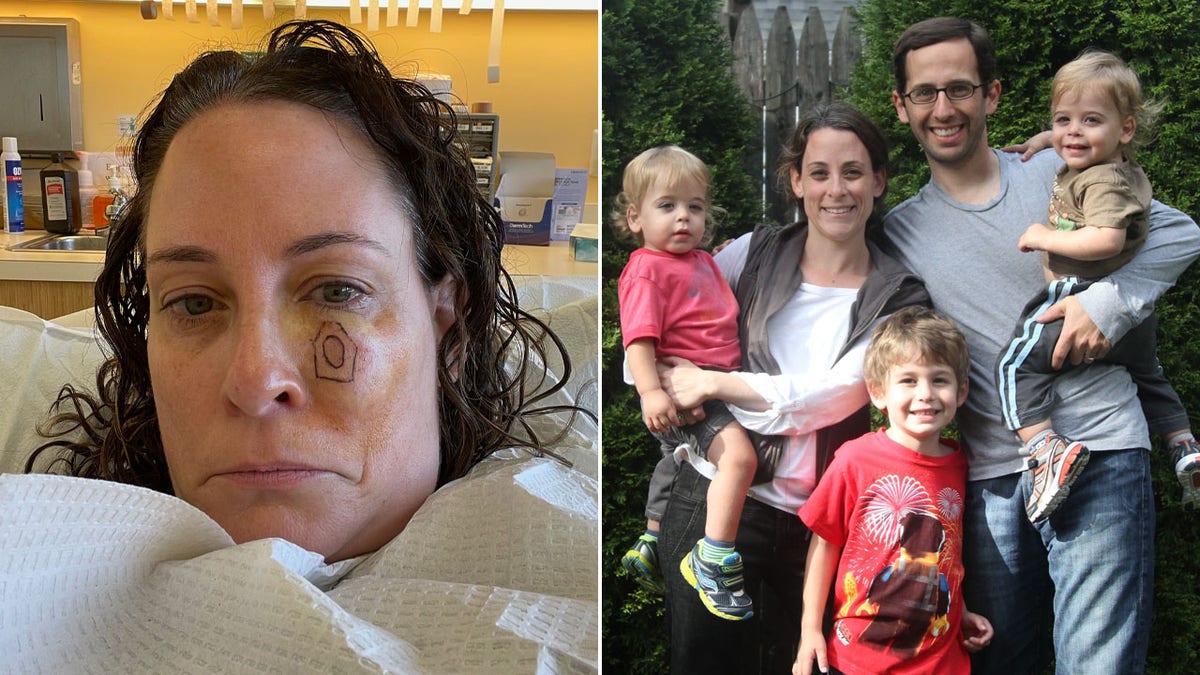
Abby Weiner, pictured at left and at right with her husband and sons, was diagnosed with melanoma in Oct. 2023. (Abby Weiner)
4. Report reveals staggering discrepancy in health care costs
Patients with private health insurance could be charged up to 300% more than those with Medicare, a new report reveals. Doctors explain the reasons for the sticker shock. Click here to get the story.

The new report published the names and pricing models of more than 4,000 U.S. hospitals. (iStock)
5. Pastor shares important message about depression
A Dallas pastor who fought his own depression battle shares how he overcame the disease – and why it’s so important for those in church leadership to seek help when they need it. Click here to get the story.
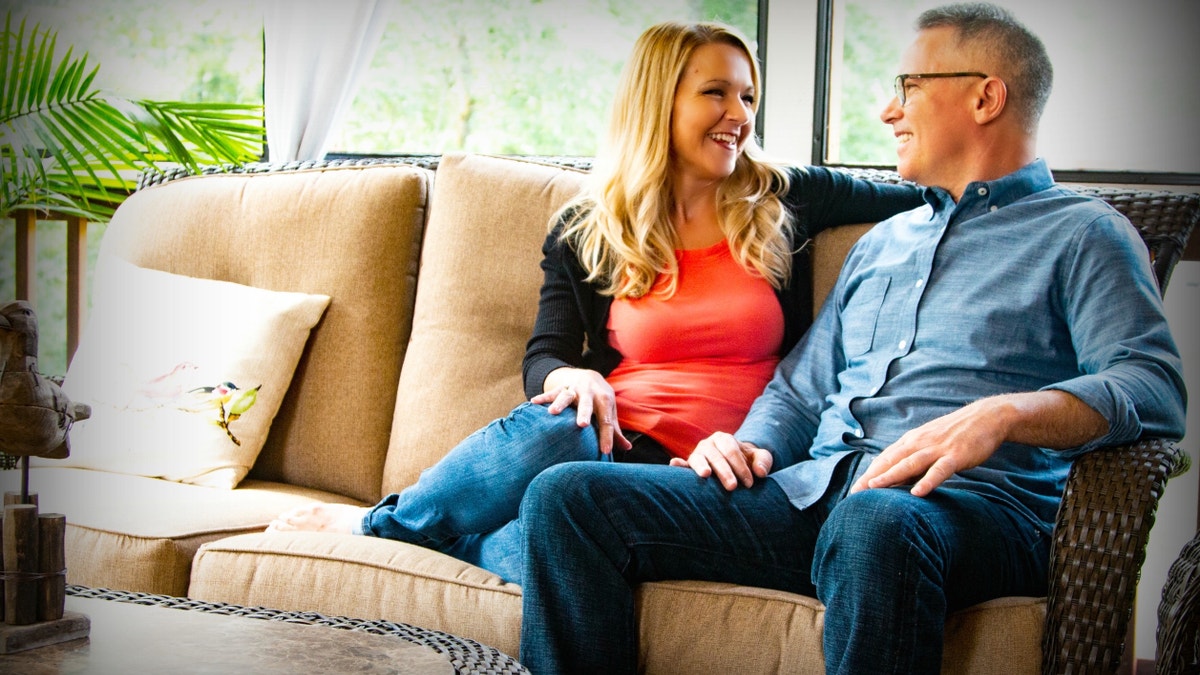
Mark Dance, pictured with his wife, Janet Dance, said he suffered through a three-year period of depression while serving as a pastor. (Dr. Mark Dance)
6. Nurse’s depression is cured through breakthrough tech
A Chicago nurse struggled with COVID-19-related PTSD and depression for years until electrical brain tapping therapy finally gave her a new lease on life. Click here to get the story.
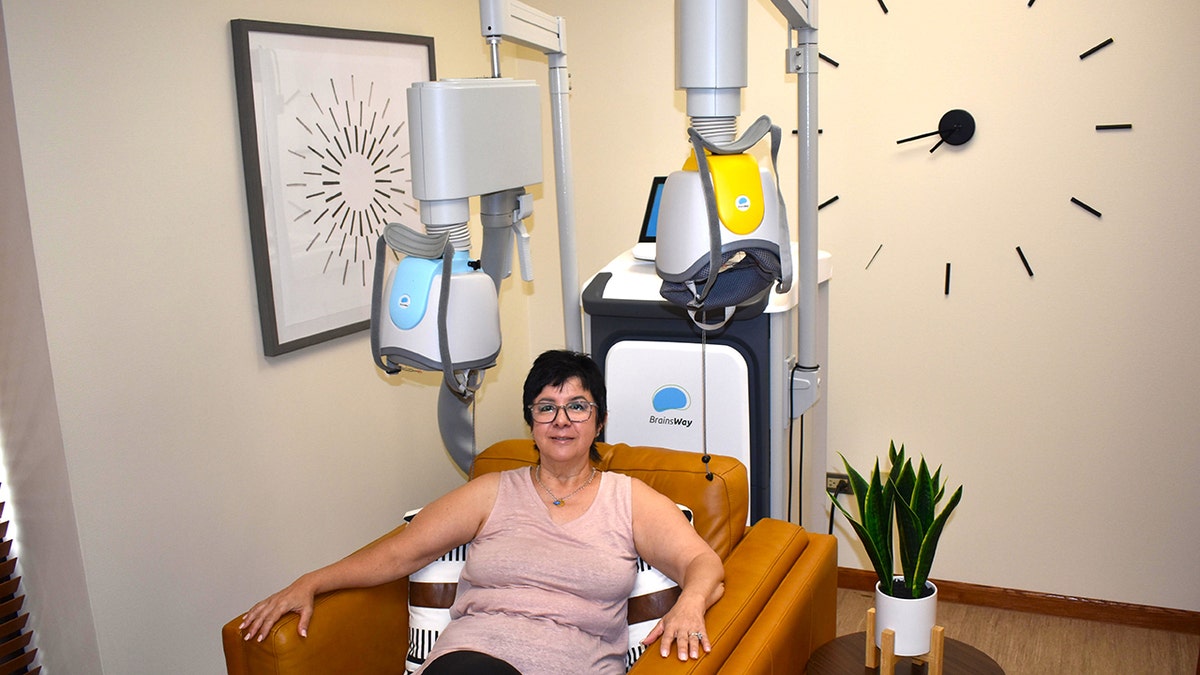
“Had I not had this treatment today, I don’t know where I’d be,” the patient told Fox News Digital. (Melanie Eilers)
7. Young vaper shares warning after nearly dying
A 22-year-old man in Nebraska required a double lung transplant due to vaping. Jackson Allard shares his story as a cautionary tale. “I had a 1% chance to live,” he said. Click here to get the story.

This week’s health stories have included a pastor’s depression journey, the sleep-hunger connection, health care cost discrepancies, bird flu updates and more. (Mark Dance, iStock)
For more Health articles, visit www.foxnews.com/health.
-

 News1 week ago
News1 week agoSkeletal remains found almost 40 years ago identified as woman who disappeared in 1968
-

 World1 week ago
World1 week agoIndia Lok Sabha election 2024 Phase 4: Who votes and what’s at stake?
-

 Politics1 week ago
Politics1 week agoTales from the trail: The blue states Trump eyes to turn red in November
-

 World1 week ago
World1 week agoBorrell: Spain, Ireland and others could recognise Palestine on 21 May
-

 World1 week ago
World1 week agoCatalans vote in crucial regional election for the separatist movement
-

 Politics1 week ago
Politics1 week agoNorth Dakota gov, former presidential candidate Doug Burgum front and center at Trump New Jersey rally
-

 Movie Reviews1 week ago
Movie Reviews1 week ago“Kingdom of the Planet of the Apes”: Disney's New Kingdom is Far From Magical (Movie Review)
-

 World1 week ago
World1 week agoUkraine’s military chief admits ‘difficult situation’ in Kharkiv region


/cdn.vox-cdn.com/uploads/chorus_asset/file/23249791/VRG_ILLO_STK001_carlo_cadenas_cybersecurity_virus.jpg)










